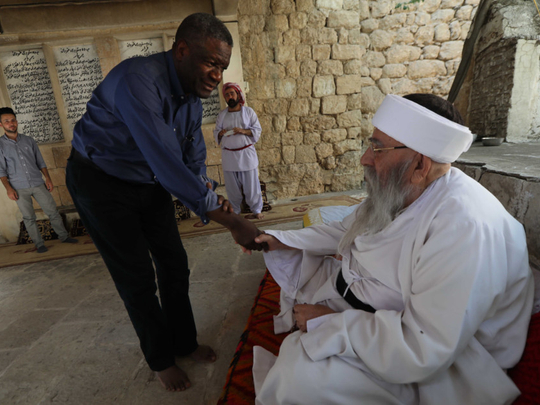
Dohuk: At the Yazidi minority’s holiest site in Iraq, Congolese gynaecologist Denis Mukwege pays homage to a spiritual leader who has decreed women raped by Daesh should not be stigmatised.
The renowned doctor shakes hands with white-bearded Khurto Hajji Esmail, the Yazidis’ Baba Shaikh or spiritual leader, in the Lalish temple where two conical roofs symbolise the journey from earth to heaven.
Yazidis are followers of an ancient religion with more than half a million believers in northern Iraq, but in 2014 Daesh kidnapped thousands of the sect’s women and girls as sex slaves.
“In many communities, women are excluded - stigmatised just after being raped”, the 63-year-old gynaecologist told AFP, just ahead of his visit to the temple in Nineveh province.
“But Baba Shaikh has said we are human... and women should not be stigmatised” after what they have suffered, he added.
The sexual enslavement of Yazidis is a tragedy Mukwege is especially qualified to talk about.
Back home in the Democratic Republic of Congo (DRC) he runs a hospital that has treated tens of thousands of women in South Kivu province.
The patients are victims of a brutal 1998-2003 war and subsequent conflicts, where mass rape has been used as a weapon of war.
Thanks to Baba Shaikh’s stance, Yazidi women can break “the silence” and give their testimony, Mukwege said.
“I think there is a way to share this experience... to join our forces to fight against rape as a weapon of war”, Mukwege said.
“When this happens, don’t say ‘It’s Iraq, Congo, Colombia, or Korea’, we have just to say our humanity was abused”, the doctor added.
He also called on the international community “to take responsibility” for the Yazidis’ treatment by Daesh, which the United Nations has branded a genocide.
“If there is no justice, if you let this happen without punishment”, it can be repeated, he told AFP.
A UN report published in August said Iraq was responsible for prosecuting perpetrators and helping victims, while warning that women who were married off to Daesh fighters risked discrimination.
Mukwege was invited to Iraq by Yazda, an NGO created in 2014 to help Yazidi women recover from the trauma of rape.
He took part in a recemt workshop in Dohuk, in northern Iraq’s autonomous Kurdistan region, to pass on expertise to those working to rehabilitate Yazidi survivors.
The doctor listened and gave advice to participants.
The training and insights from DRC will benefit “our community through medical support, psycho-social support, legal support and also livelihood support” for affected women, Yazda member Nagham Alawka said.
“I wanted to see how they experience it, how they get over it... so I can help the women in my community who have been under Daesh, who have been survivors to really rebuild and change this pain into power,” Alawka said.
More than 6,400 Yazidis were enslaved by Daesh in 2014, according to Kurdistan’s Ministry of Religious Affairs.
Of this total, some 3,200 were rescued or successfully escaped.
The fate of the others is unknown - and in some cases might never be confirmed.
Military offensives by Iraqi security forces against Daesh saw its so-called caliphate crumble, with some surviving militants fleeing to neighbouring Syria.
Alongside the kidnappings, Daesh killed thousands of Yazidis.











